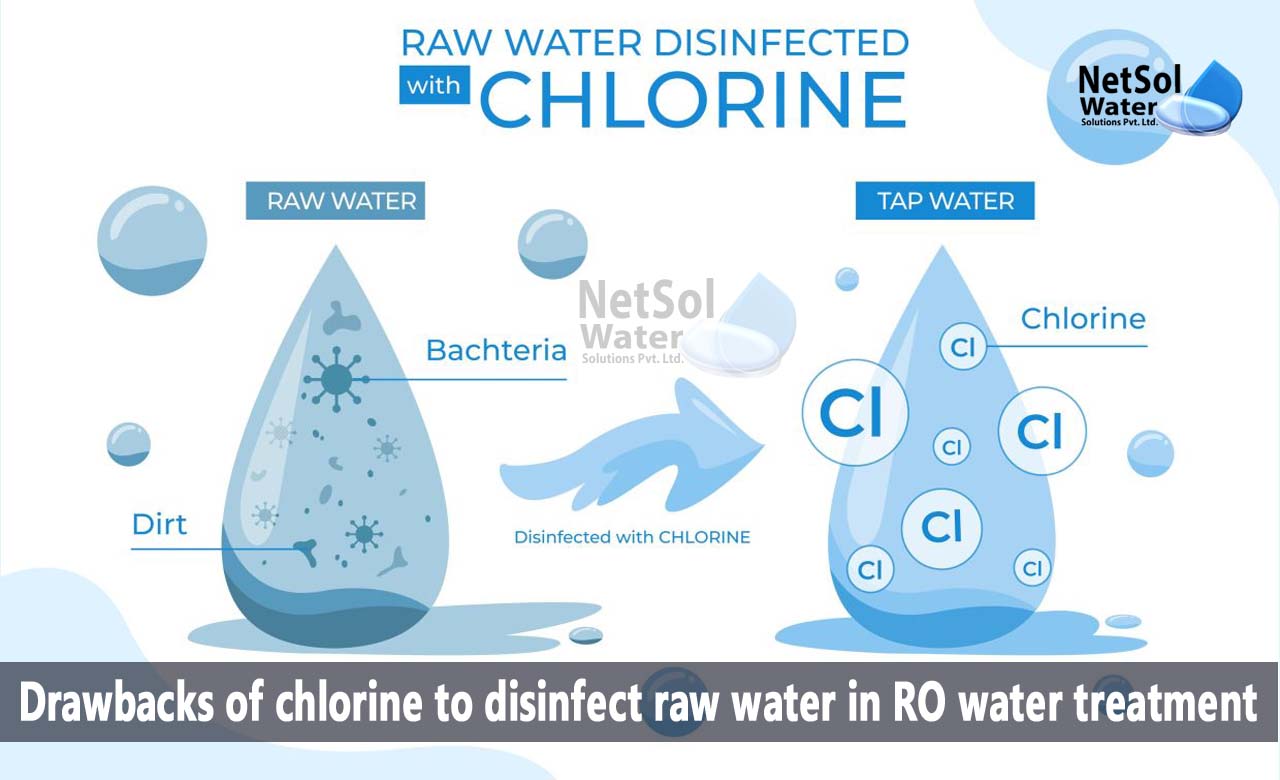Chlorine residual must not come into touch with the membrane, since chlorine will irreparably harm a polyamide RO membrane. This means that after dechlorination, the remaining bacteria will grow once more and the dead bacteria, will serve as assimilable carbon sources for the remaining bacteria.
Let’s look at few of the drawbacks of using chlorine to disinfect raw water in RO water treatment.
Dechlorination chemicals like bisulfite can be used, however using too much of them will scavenge dissolved oxygen, creating an anaerobic environment that can promote the growth of some slime-forming bacteria, like sulfate-reducing bacteria. The situation is not much better with carbon filters, which serve as a breeding habitat for bacteria in the de-chlorinated water, by adsorbing organics and supplying them with AOC.
Numerous RO systems that recycle wastewater add chlorine to their feed water, which already has significant levels of ammonia. As a result, chloramines are created that are safe for direct membrane contact up to 5 ppm as combined chlorine. The benefit of doing this is that the membrane system is kept in a biostatic environment.
Drawbacks of chlorine to disinfect raw water in RO water treatment
This would be perilous, though, if the water did not already include ammonia, as any failure that resulted in a loss of ammonium sulphate dosage, would cause irreparable harm to your membranes. Because, bromide salts in saltwater will produce bromamines, which can harm polyamide membranes, the usage of chloramines is not feasible.
Chlorination should generally be avoided because it will most likely make bio-fouling problems worse. In general, it is recommended to periodically disinfect the membranes with non-oxidizing biocides as DBNPA, in order to increase the intervals between cleanings. Reduce cleaning frequency by flushing permeate before every shut down or every 12 hours.
Can chlorine dioxide efficiently pre-chlorinate bore well water, RO feedwater, and permeate water in place of sodium hypochlorite?
1: In comparison to hypochlorite, chlorine dioxide is a more effective biocide at killing bacteria, viruses, and protozoa without allowing them to develop resistance. It has grown in popularity because, compared to chlorine, it produces much fewer quantities of disinfection by-products such as trihalomethanes (THMs) and haloacetic acids (HAAs).
2: It is efficient over a wide pH range as both a biocide and a metal precipitant.
3: However, at least one study has demonstrated that the presence of naturally occurring organic matter (NOM), such as humic acids, still has a substantial impact on THM production.
4: Chlorine dioxide is a potent oxidant and can destroy polyamide reverse osmosis (RO) membranes, hence, a reducing agent such as sodium bisulfite is frequently dosed as a precautionary measure.
Conclusion
The use of chlorine dioxide at low residuals would decline before contact with the RO membrane surface. However, like with any other biocide, biofouling will be exacerbated when the residue depletes to sub-lethal concentrations, before membrane contact.
Chlorine dioxide can be utilized in the permeate, but only in small amounts as it is converted to chlorite and chlorate ions, which can harm the neurological system and induce anaemia.
Harm done by chlorine
Chlorine's effects have been extensively studied, and the results indicate that the main cause for concern is that it reacts with organic natural materials, like leaves and humus to produce disinfection by-products that are thought to be carcinogenic. One of the most efficient and cost-effective ways to remove chlorine from drinking water, is to install a reverse osmosis drinking water system.
If you need any advice on a water treatment problem, Netsol Water can guide you towards the best water filtration system for your requirements. We have attempted to present a lot of information on our website, because we believe it is crucial to educate one-self.
Netsol Water is Greater Noida-based leading water & wastewater treatment plant manufacturer. We are industry's most demanding company based on client review and work quality. We are known as best commercial RO plant manufacturers, industrial RO plant manufacturer, sewage treatment plant manufacturer, Water Softener Plant Manufacturers and effluent treatment plant manufacturers. Apart from this 24x7 customer support is our USP. Call on +91-9650608473, or write us at enquiry@netsolwater.com for any support, inquiry or product-purchase related query.



